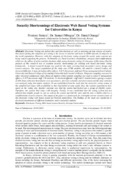| dc.description.abstract | Electronic Voting can deliver free and fair elections as well as ensuring on time release of results.
One factor fueling the adoption of e-voting is the access to internet and more so GSM network, by majority of
the world population. However, with this adoption of electronic voting around the world, some concern are
being raised regarding the process. Technically, it’s hard to achieve availability, integrity and confidentiality
which are the pillars of a free and fair elections while using electronic voting. It is because of this issues that the
purpose of this research was to examine security shortcomings for existing web based electronic voting
frameworks. A mixed research design was used for the study covering both descriptive survey design and
content analysis. The target population of the study was 13700 students, 60 student’s council leaders, 64
electoral Officials, 4 dean of student office officer, 6 ICT directorate staff and 29 top management from Catholic
University and Kenya College of Accounting University both located in Kenya. Purposive sampling was used to
select electoral commission chair, Dean of students while random sampling was used to select 6 management
officers, 6 ICT directorate staff, 376 students, 14 electoral officials’ staff and 12 student leaders giving a sample
of 420. Data collection Instruments were questioners, interview schedule and observation and the data collected
was analyzed using descriptive analysis. It was established from the study that the university voting system of
the sampled had issues with availability as they had failed at some point. Also, the systems experienced slow
speed on the voting day. Another outcome was that the system had locked out a group of eligible voters.
Therefore, the systems had issues with integrity. Finally, it was established that the voting system had not
allowed non eligible people to vote as well as the system can link the voter and the voter’s ballot which is a
confidentiality security concern. The output of the paper is a framework for solvingthe current security issues of
the electronic voting web based system for Kenyan universities. The findings of the study are significant to
electoral commissions of different institution, voters and policy makers | en_US |

